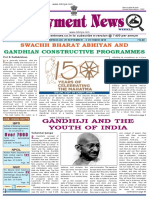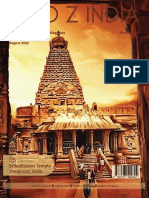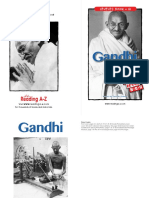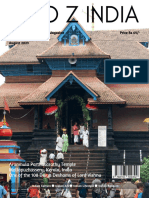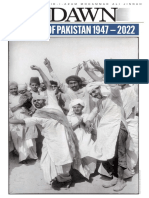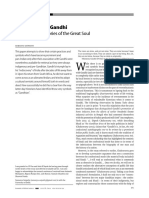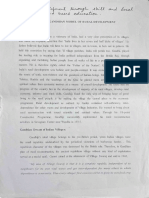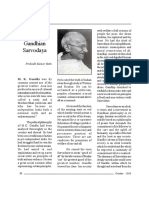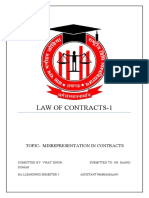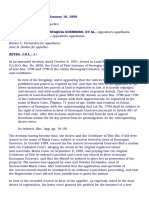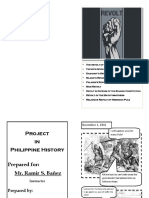Professional Documents
Culture Documents
Poona Pact
Uploaded by
BK AtalOriginal Description:
Original Title
Copyright
Available Formats
Share this document
Did you find this document useful?
Is this content inappropriate?
Report this DocumentCopyright:
Available Formats
Poona Pact
Uploaded by
BK AtalCopyright:
Available Formats
HIN DUSTA N T IMES, N EW D E LH I
T UESDAY, O CTO B E R 01 , 2 01 9 hindustantimes 11
The caste
YEARS ON
question
1869 - 2019
GANDHI, AMBEDKAR
PERSPECTIVE TRIDIP SUHRUD
AND THE POONA PACT n BR Ambedkar with EV Ramasamy
(Periyar) in erstwhile Rangoon, 1954.
WIKIMEDIA COMMONS
OP Jindal Global University.
Gandhi’s reading of caste fundamentally
differed from Ambedkar, explained
Suparna Gooptu, director of the Gandhian
Studies Centre, Kolkata. While Ambedkar
preferred a rights-based approach, Gan-
dhi’s approach was through faith and spiri-
tuality. “Unlike Ambedkar, Gandhi felt that
any exploitative relationship could be recti-
fied only when the exploiter had a change of
heart. So he worked with upper castes to
change their mindset,” she added.
Nishikant Kolge, a scholar at Delhi-based
Centre for the Study of Developing Socie-
ties, argued that Gandhi showed “remarka-
ble irreverence” towards untouchability,
and frequently ate with people from other
castes. In his ashrams, the settlers came
from all castes and religions. So, it is unclear
why Gandhi took such a strong position
against separate electorates, but a conver- Gandhi with
Gandhi and Gujarat: At home
n
sation between him and Vallabhbhai Patel, satyagrahis in
recorded by Mahadev Desai and quoted by Kheda
Eleanor Zelliot in Dr Babasaheb Ambedkar district,
and The Untouchable Movement, offers a
clue. Patel asked why Gandhi was going on
a fast, and the latter replied that separate
electorates would leave Gandhi with no way
to deal with “untouchables”. “They do not
Gujarat, 1929
ALAMY STOCK
PHOTO and in self-imposed exile
realise that the separate electorate will cre- HARD LOOK The state was his birthplace and the site of his experiments with
ate division among Hindus so much that it
will lead to bloodshed,” he told Patel. truth. But it must analyse its points of divergence from the Father of the Nation
THE IMPACT, TODAY
For India’s 300 million scheduled caste peo-
ple, many Ambedkarite scholars have
argued, the Poona Pact fundamentally dis-
torted the form of representation of Dalits.
DALIT QUESTION The impact of MK Gandhi’s principled India reserves seats in Parliament and
assemblies for SCs in proportion to their
resistance to BR Ambedkar’s political demand for separate population. For example, in the Lok Sabha,
84 of the 543 seats are reserved for members
electorates for the so-called depressed classes lives on of SC communities. But Dalits are not con-
centrated in any specific area, so in a major-
ity of these seats, they form a minority of the
electorate. An HT analysis of numbers by
the Trivedi Centre for Political Data showed
that out of the 84, Dalits make up a third of
the electorate in only 13. In just one constitu- n Gandhi with
ency — Jalpaiguri in West Bengal — does Kasturba and
this figure cross 50%. This means that while Sardar
Dhrubo Jyoti The Poona Pact was signed at 5pm on Sep- the MP is SC, the majority of the electorate Vallabhbhai
n dhrubo.jyoti@hindustantimes.com tember 24 by 23 people. Madan Mohan is not and their influence is decisive. Patel at a prayer
Malaviya signed it on behalf of Hindus and “In a caste-ridden society, this means that meeting,
I
t is September 19, 1932, and morning Gandhi; Ambedkar on behalf of depressed the Dalit MP has to compromise and keep Gujarat, 1940s.
has just dawned on Bombay (now classes. Instead of the 80 seats given by the the upper castes happy, and cannot work DINODIA PHOTOS /
known as Mumbai), but dignitaries British, the depressed classes got 148 seats. genuinely for the marginalised castes. Such ALAMY STOCK PHOTO
are already crowding the front porch At the end of the talks, Gandhi’s trusted a system robs Dalits of genuine leadership
A
of the Indian Merchants Chamber emissary, C Rajagopalachari, exchanged his and the community suffers because leaders At 6.30 am, on March 12, 1930 MK “untouchable” family of Dudabhai, Danibehn
Hall. They have an urgent mission: to fountain pen with Ambedkar. are dependent on their party’s vote bank to Gandhi, accompanied by co-march- and their daughter Lakshmi, who joined the
save MK Gandhi’s life, and they have less get elected; they cannot be independent,” ers, left the Sabarmati ashram for ashram community. The internal rumblings
than 24 hours to do so. For weeks, tensions A FUNDAMENTAL CLASH said Bhagyesha Kurane, a law student at Dandi, a coastal village in Gujarat. in the ashram did not stop, nor did the opposi-
have been rising between Gandhi, lodged in The Poona Pact represented a clash of two Pune University. He did not ever return to live in the ashram tion from the citizens from Ahmedabad.
a prison in what was then Poona, on sedition ideas: of caste and citizenship. Ambedkar’s that he had created and nurtured since 1917. It In 1917, the ashram shifted further away
charges, and Bhimrao Ramji Ambedkar, reading of caste, according to historian Pra- AMBEDKAR’S POINT is evident that the self-imposed exile applied from the city to the banks of river Sabarmati.
who would go on to steer India’s Constitu- bodhan Pol, pivoted on seeing the Dalit Ambedkar’s views on political representa- not only to the ashram but also increasingly to A plague in Kocharb was the immediate rea-
tion, over the latter’s demand of separate question as a political issue, and not only a tion of the depressed classes began with his the city of Ahmedabad and Gujarat itself. son for the hasty move to a barren piece of
electorates for India’s “depressed classes” social one, as Gandhi did. “The Gandhi -Am- submission before the Southborough Com- In the remaining 18 years of his life, Gandhi land. Gandhi spoke of the proximity of the site
or “untouchables”, who are called Sched- bedkar conflict was over how to understand mittee in 1919, when he was just 28. His belief was to spend some 301 days in Gujarat. His last to the prison and ashram of the ancient sage
uled Castes (SC) today. caste. Ambedkar insisted, for the first time in universal adult franchise was rooted in visit to Ahmedabad was on November 2, 1936. Dadhichi. What he chose not to disclose was
Separate electorates meant that members in India’s modern history, that caste was a the depressed classes getting cheated of His exile from Ahmedabad is reminiscent of a that the site was situated in close proximity to
from these communities would elect a repre- political question, and couldn’t be their voting rights by British India’s restric- tap (penance). a smashan, a crematorium. Gandhi could not
sentative to legislative assemblies, and addressed by social reforms only,” he said. tions of land and wealth ownership on the If we understand this obvious turning away but have grasped what it meant for a Hindu to
caste Hindus would not be eligible to vote in In his writing and speeches, Ambedkar electorate. Pol noted that the Gandhi-Am- from Gujarat on the part of Gandhi, we might live in the proximity of a smashan.
that election. After protracted negotiations insisted that a political democracy was bedkar relationship was not premised on be able to capture something of the relation- It was not just a constant reminder of mor-
at the second Round Table Conference, the meaningless if the so-called depressed antagonism and became so in the 1940s and ship that Gujarat has shared with him. The tality and the precariousness of human exis-
British government had formalised sepa- classes were not equal participants in it. 50s. “If you devoted yourself entirely to the day he left the ashram, an unprecedented tence, but it was also a reminder of what it
rate electorates on August 15, 1932. Almost “Most importantly for Ambedkar, the welfare of the depressed classes, then you crowd gathered to bid him and the marchers meant to live as an outcaste, outside the pale
immediately, Gandhi publicly opposed this. ability of the depressed classes to elect their would become our hero,” Ambedkar told a farewell. Gandhi wrote; “Thousands of of city and civitas. It also signifies the liminal
“I have to resist your decision with my own representatives was a way to achieve Gandhi during the Poona Pact negotiations. Ahmedabad citizens, both men and women, position that Gandhi and his followers had
life,” he wrote to the then British Prime Min- full potential of democracy. For this, voting But this would not last. In a 1955 inter- kept vigil on the night of the 11th. Thousands come to occupy in the caste hierarchy of
ister Ramsay Mcdonald, on August 18. in an electorate free from the influence of view to BBC, Ambedkar attacked Congress flocked to the Ashram… I can never forget the Ahmedabad. Gandhi and his companions,
“What I am against is their statutory separa- caste Hindus was required, and Gandhi did and Gandhi on SC representation. “As a pol- scene. For me, this was the form in which even during the Dandi march, were often
tion even in a limited form, from the Hindu not understand this,” said Sumeet Mhaskar, itician, he [Gandhi] was never a Mahatma. God’s blessings descended on me.” But, ever regarded as outcastes.
fold…” he reiterated on September 9, but the an associate professor of political science at I refuse to call him Mahatma,”he said. suspicious of adoring crowds, Gandhi was Notwithstanding its liminality, the ashram
British refused to renege on their decision. quick to realise that perhaps this was the soon became the centre of the city’s political
On September 20, Gandhi began his fast n A photo by extent of self-sacrifice for many. “But I am not economy with Gandhi’s arbitration and sub-
unto death. Raja Sekhar Vundru notes in his Margaret a man to be easily taken in by appearances... sequent fast in the dispute involving the mill
book, Ambedkar, Gandhi and Patel: The Bourke-White Many had come out just because others had owners and mill hands of Ahmedabad. This
Making of India’s Electoral System, Gan- of BR done so. For many others, this coming out for mode of arbitration was to become the bed-
dhi’s emissaries had communicated that he Ambedkar on the festival was the beginning and the end of rock for industrialisation of Gujarat. It also
was not only opposed to separate elector- his veranda, their self-sacrifice.” contributed to the deep unease with the left
ates, but was also not convinced of reserved 1946. The capacity for self-sacrifice is what Gan- politics in the political culture of Gujarat.
seats. “I shall not deter from my pious duty THE LIFE dhi wanted from us. This was not, in each The Hindu-Muslim unity was a striving
and betray the just and legitimate trust of PICTURE COLLECTION instance, bodily sacrifice or enduring long that was to remain incomplete in Gandhi’s
VIA GETTY IMAGES periods of incarceration. In some ways it was life. The one aspect where contemporary Guj-
the people even if I am hanged,” Ambedkar
told the Congress, reiterating that his prob- more fundamental. He wanted us — a society arat has moved furthest away from him is on
lem with joint electorates was that dominated by merchant-capitalists — to be the communal question. The regularity with
depressed classes would be robbed of inde- free from avarice. Not just pure greed but even which we have turned against ourselves in a
pendent leadership in a constituency the need to be possessive. The ashramic ideals macabre orgy of violence and pragmatically
numerically dominated by caste Hindus. of aparigraha (non-possession) and asteya and remorselessly moved ahead fundamen-
With time running out, leaders proposed (non-stealing) stood in contrast to the ethos of tally violates all that Gandhi strove for.
a two-tier system: a primary election where mercantile culture. The fact that Ahmedabad One aspect of Gujarat that perturbed Gan-
only Dalits would vote and a secondary elec- bears testimony to the trusteeship of a few dhi — despite or perhaps because of his prox-
tion where both caste Hindus and Dalits wealthy who selflessly helped create some of imity to it — was the feudal culture. Rajkot
would vote. On the morning of September the finest institutions of higher learning was home for Gandhi. His only fast against a
22, Ambedkar travelled to Poona. “I want should not lead to a mistaken belief that Guja- princely state for its breach of trust was
political power for my community. That is rati culture is any less suspicious of Gandhi’s against the State of Rajkot that his father had
indispensible for our survival,” he told Gan- attitude to money and inheritance. served as a Diwan. Before leaving Rajkot in
dhi, Mahadev Desai, Gandhi’s secretary, The second form of unease with Gandhi June 1939, Gandhi said: “Rajkot seemed to
wrote in his notes. came from his conviction that untouchability have robbed me of my youth. I never knew
The pressure on the Maharashtrian was was a sin. About 25 men and women became that I was old. Now I am weighed down by the
mounting; he had received several death the first inhabitants of the Satyagraha ashram knowledge of decrepitude. I never knew what
threats already. “Almost all major newspa- at Kochrab. Gandhi and his ashram were soon it was to lose hope. But it seems to have been
pers were backing Gandhi and opposing “put on the anvil”, as he put it, with the first cremated in Rajkot. My ahimsa has been put
Ambedkar. His blood pressure, whether he to a test such as it has never been subjected
had water, were front page news every day,” before.”
said scholar and cartoonist, Syamsundar What he said of Rajkot was said to us all,
He wanted us — a society dominated by merchant-capi-
Vunnamati. Ambedkar finally relented Gujaratis then and now.
talists — to be free from avarice. The ashramic ideals of
after his friend and Tamil leader, MC Rajah,
‘aparigraha’ (non-possession) and ‘asteya’ (non-steal- Tridip Suhrud has recently published a critical edition of
pointed out that Dalits would battle insur-
ing) stood in contrast to the ethos of mercantile culture. M K Gandhi’s Autobiography
mountable prejudice if they were seen as not
having compromised for Gandhi’s life. and ‘The Diary of Manu Gandhi 1943-1944’
You might also like
- Mupas vs. PeopleDocument1 pageMupas vs. PeopleJay Em100% (1)
- A To Z India - October 2022Document40 pagesA To Z India - October 2022Indira SNo ratings yet
- 5ba9f8295cce729 5 PDFDocument47 pages5ba9f8295cce729 5 PDFaviralNo ratings yet
- A To Z India - June 2022Document36 pagesA To Z India - June 2022Indira SrivatsaNo ratings yet
- A To Z India - December 2023Document40 pagesA To Z India - December 2023Indira SNo ratings yet
- A To Z India - August 2022Document40 pagesA To Z India - August 2022Indira SNo ratings yet
- A To Z India - April 2024Document40 pagesA To Z India - April 2024Indira SNo ratings yet
- A To Z India - February 2022Document36 pagesA To Z India - February 2022Indira SrivatsaNo ratings yet
- A Part That PartedDocument2 pagesA Part That PartedRaghunath JeyaramanNo ratings yet
- A To Z India - June 2023Document40 pagesA To Z India - June 2023Indira SNo ratings yet
- Raz Lq40 Gandhi CLRDocument9 pagesRaz Lq40 Gandhi CLRaprilia rahmawatiNo ratings yet
- Desperate Measures: How Piketty Got It WrongDocument1 pageDesperate Measures: How Piketty Got It Wrongpawan sharmaNo ratings yet
- WWW Speakingtree in Spiritual-Blogs Seekers Self-Improvement Hidden-Facts-About-The-Nehrugandhi-Dynasty 2 PDFDocument7 pagesWWW Speakingtree in Spiritual-Blogs Seekers Self-Improvement Hidden-Facts-About-The-Nehrugandhi-Dynasty 2 PDFaniket mitraNo ratings yet
- A To Z India - August 2023Document40 pagesA To Z India - August 2023Indira SNo ratings yet
- Adani Foundation Annual Report 2018Document83 pagesAdani Foundation Annual Report 2018Rajeev ChauhanNo ratings yet
- TheHindustanTimes 25aug2010Document1 pageTheHindustanTimes 25aug2010Arunkumar SeenivasaganNo ratings yet
- A To Z India - December 2021Document36 pagesA To Z India - December 2021Indira SrivatsaNo ratings yet
- A To Z India - April 2022Document36 pagesA To Z India - April 2022Indira SrivatsaNo ratings yet
- A To Z India - March 2024Document40 pagesA To Z India - March 2024Indira SNo ratings yet
- Wednesday, January 21, 2015Document20 pagesWednesday, January 21, 2015rameshkumarNo ratings yet
- A To Z India - July 2023Document40 pagesA To Z India - July 2023Indira SNo ratings yet
- Indira's Philosophy, Ideology of Indira GandhiDocument3 pagesIndira's Philosophy, Ideology of Indira GandhiIndira gandhiNo ratings yet
- A To Z India - May 2022Document36 pagesA To Z India - May 2022Indira SrivatsaNo ratings yet
- Patrick Geddes: An Unfinished WorkDocument9 pagesPatrick Geddes: An Unfinished WorkStephen McCulloughNo ratings yet
- Understanding Gandhi's Vision of Swadeshi ArticleDocument8 pagesUnderstanding Gandhi's Vision of Swadeshi ArticleRomaNo ratings yet
- Heartfulness Magazine - December 2022 (Volume 7, Issue 12)Document84 pagesHeartfulness Magazine - December 2022 (Volume 7, Issue 12)HeartfulnessNo ratings yet
- A To Z India - March 2023Document40 pagesA To Z India - March 2023Indira SNo ratings yet
- Magzine The Hindu PDFDocument12 pagesMagzine The Hindu PDFRajeev KumarNo ratings yet
- 75 Year of Pakistan 14-Aug Supp - 2022 FinalDocument68 pages75 Year of Pakistan 14-Aug Supp - 2022 FinalShaun SinghNo ratings yet
- A To Z India - February 2024Document40 pagesA To Z India - February 2024Indira SNo ratings yet
- Gandhi and Ambedkar Complementary PathwaysDocument7 pagesGandhi and Ambedkar Complementary PathwaysAnil KethaNo ratings yet
- Compulsory English OCS (M) 2020Document12 pagesCompulsory English OCS (M) 2020debabratrath786No ratings yet
- A To Z India - January 2024Document40 pagesA To Z India - January 2024Indira SNo ratings yet
- A To Z India - September 2023Document40 pagesA To Z India - September 2023Indira SNo ratings yet
- A To Z India - November 2022Document40 pagesA To Z India - November 2022Indira SNo ratings yet
- Turban, Bindi Ok. Not Hijab Musician With Gold (En) Touch: Raut Eyeing CM's Chair, Says RaneDocument19 pagesTurban, Bindi Ok. Not Hijab Musician With Gold (En) Touch: Raut Eyeing CM's Chair, Says RaneWahid AhmedNo ratings yet
- Exploring Alternatives To ViolenceDocument11 pagesExploring Alternatives To Violencenica onicaNo ratings yet
- Delays Add To The Trauma: Learn A Unique Lesson From BapuDocument1 pageDelays Add To The Trauma: Learn A Unique Lesson From BapukiranNo ratings yet
- The Magic of The MindDocument53 pagesThe Magic of The Mindvasanth_aeroin100% (3)
- Geddes in India: Town Planning, Plant Sentience, and Cooperative EvolutionDocument18 pagesGeddes in India: Town Planning, Plant Sentience, and Cooperative EvolutiondiptilundiaNo ratings yet
- Bhagwad Gita Distribution: in School SDocument7 pagesBhagwad Gita Distribution: in School SKamalNo ratings yet
- Gandhi Before Gandhi PDFDocument11 pagesGandhi Before Gandhi PDFAshish ValechaNo ratings yet
- Times Nie Web Ed April 13 2022Document4 pagesTimes Nie Web Ed April 13 2022Ishwari BhoirNo ratings yet
- What WHY HOW: Indo-Us 2+2 DialogueDocument4 pagesWhat WHY HOW: Indo-Us 2+2 DialogueVedha PatelNo ratings yet
- Heartfulness Magazine - May 2019 (Volume 4, Issue 5)Document43 pagesHeartfulness Magazine - May 2019 (Volume 4, Issue 5)HeartfulnessNo ratings yet
- Ambedkar-Congress and GandhiDocument20 pagesAmbedkar-Congress and Gandhipink1231No ratings yet
- Employment News 17.08.18Document56 pagesEmployment News 17.08.18BUSINESS EDITORNo ratings yet
- Gandhi Rural Development HandoutDocument11 pagesGandhi Rural Development HandoutSukriti JainNo ratings yet
- Ch-5 Indigo - Module II - Gandhian Principles & His Significance in Modern TimesDocument13 pagesCh-5 Indigo - Module II - Gandhian Principles & His Significance in Modern TimesHyperRudyツNo ratings yet
- Pib AugDocument52 pagesPib AugParth SinghNo ratings yet
- Gandhi - Ambedkar On UntouchabilityDocument5 pagesGandhi - Ambedkar On UntouchabilityAshwini RaiNo ratings yet
- Bhagavad Gita Guide For Beginners PDFDocument28 pagesBhagavad Gita Guide For Beginners PDFNirajDhotre100% (2)
- Gandhian Sarvodaya: Prabodh Kumar RathDocument4 pagesGandhian Sarvodaya: Prabodh Kumar RathAfriza KhatunNo ratings yet
- Gandhi'S: Management GuruDocument4 pagesGandhi'S: Management GuruNikhil AryaNo ratings yet
- Gandhi and India's Engagement With Political ModernityDocument35 pagesGandhi and India's Engagement With Political ModernitymailtonilotpalNo ratings yet
- Doctor By Chance-Mystic By Choice; Memoir Of A Doctor's Journey From Medicine To SpiritualityFrom EverandDoctor By Chance-Mystic By Choice; Memoir Of A Doctor's Journey From Medicine To SpiritualityNo ratings yet
- The Bhagavad Gita According to Gandhi (Rediscovered Books): With linked Table of ContentsFrom EverandThe Bhagavad Gita According to Gandhi (Rediscovered Books): With linked Table of ContentsRating: 4 out of 5 stars4/5 (1)
- Lea1 PRELIM PERIOD MODULEDocument41 pagesLea1 PRELIM PERIOD MODULEKlein GajoNo ratings yet
- Josh Guillory Turns To Side Hustles For More Income - The CurrentDocument1 pageJosh Guillory Turns To Side Hustles For More Income - The CurrentDarrenGauthierNo ratings yet
- Misrepresentation in ContractDocument12 pagesMisrepresentation in Contractvirat singh100% (1)
- Cano V Dir. of LandsDocument3 pagesCano V Dir. of LandsMatthew ChandlerNo ratings yet
- Application of Bail Under Section 437 CRPCDocument2 pagesApplication of Bail Under Section 437 CRPCRajbir kaurNo ratings yet
- OECD Broadband Stats - Fibre Connections in Countries - Dec 2010Document3 pagesOECD Broadband Stats - Fibre Connections in Countries - Dec 2010gingerbeer1No ratings yet
- OCA vs. Judge Aquino Procedural Short-Cuts PDFDocument7 pagesOCA vs. Judge Aquino Procedural Short-Cuts PDFPeterD'Rock WithJason D'ArgonautNo ratings yet
- Law 1540-A01 - Morrison, Danielle - 007806074 - Letter To ClientDocument4 pagesLaw 1540-A01 - Morrison, Danielle - 007806074 - Letter To ClientDanielleH.MorrisonNo ratings yet
- Introduction To Geotechnical Engineering 2nd Edition Holtz Solutions ManualDocument27 pagesIntroduction To Geotechnical Engineering 2nd Edition Holtz Solutions Manualeiriantiengc7100% (29)
- PR PDFDocument17 pagesPR PDFVIGNESHNo ratings yet
- Family Law - Unit 7 - Maintenance & Child CustodyDocument34 pagesFamily Law - Unit 7 - Maintenance & Child CustodyPsalm KanyemuNo ratings yet
- Pakistan Studies Assignment 1Document5 pagesPakistan Studies Assignment 1Hassan ExonetteNo ratings yet
- Day - 1Document4 pagesDay - 1omkar yadavNo ratings yet
- G.R. No. 43495 - People of The Philippines vs. Marcelo HonradaDocument2 pagesG.R. No. 43495 - People of The Philippines vs. Marcelo HonradaDat Doria PalerNo ratings yet
- Comic Strips PDFDocument10 pagesComic Strips PDFStephanie Balais AsangNo ratings yet
- Sample Trust Indenture Post 1757Document6 pagesSample Trust Indenture Post 1757vj xiver100% (1)
- Section - 27 of Special Marriage - SampleDocument9 pagesSection - 27 of Special Marriage - SampleShilesh PatelNo ratings yet
- In Re AstroworldDocument12 pagesIn Re AstroworldBillboardNo ratings yet
- Unleashing Mr. Darcy by Teri Wilson - Chapter SamplerDocument17 pagesUnleashing Mr. Darcy by Teri Wilson - Chapter SamplerHarlequinAustralia100% (1)
- Goodyear OTR WarrantyDocument4 pagesGoodyear OTR WarrantyMohamad YunandaNo ratings yet
- Review of COGS and CGMDocument4 pagesReview of COGS and CGMChloe Ann CabayloNo ratings yet
- Title: Presidential Decree No. 1529: "Property Registration Decree"Document3 pagesTitle: Presidential Decree No. 1529: "Property Registration Decree"paolo_tien89No ratings yet
- FLORES - Working PapersDocument2 pagesFLORES - Working PapersMaureen FloresNo ratings yet
- Family Law Final ProjectDocument21 pagesFamily Law Final ProjectpraveenNo ratings yet
- Barangay Agenda For Governance and Development: Bneo For Great Barangays ProgramDocument7 pagesBarangay Agenda For Governance and Development: Bneo For Great Barangays ProgramBarangay Abuyog75% (4)
- Talaifar v. Masoud Malek - Malpractice Complaint Superior Court SC106760Document11 pagesTalaifar v. Masoud Malek - Malpractice Complaint Superior Court SC106760LATORTSNo ratings yet
- Covering Letter ASHU KUMARDocument2 pagesCovering Letter ASHU KUMARYou goabroadNo ratings yet
- Specification For Chain Link Fence and GatesDocument8 pagesSpecification For Chain Link Fence and GatesSuresh BabuNo ratings yet
- (15-00293 429-4) Declaration of Laurence SchneiderDocument16 pages(15-00293 429-4) Declaration of Laurence SchneiderJessie SmithNo ratings yet


